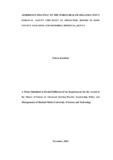ADHERENCE PRACTICE TO THE WORLD HEALTH ORGANIZATION’S SURGICAL SAFETY CHECKLIST IN OPERATING ROOMS IN KISII COUNTY TEACHING AND REFERRAL HOSPITAL, KENYA
Abstract
World Health Organization (WHO) introduced the Surgical Safety Checklist (SSC) in
2008 to assure safety in operating rooms (ORs). Globally, adherence level varies with
developing countries posting the lowest levels compared to their developed
counterparts. The main objective of the study was to evaluate adherence practices to
the WHO SSC in ORs in Kisii County Teaching & Referral Hospital (KTRH). The
specific objectives were to assess the level of adherence and to determine staff and
institutional related factors that influence adherence to the WHO SSC in ORs in
KTRH. The study preferred a mixed method cross-sectional design. WHO SSC
adherence level was assessed by conducting a retrospective review of 424 randomly
selected surgical files. The OR staff were selected through a census method and 31
responded to the interviews to determine both staff and institutional factors that
influenced adherence to the WHO SSC. Qualitative data was analysed using SPSS and
both descriptive & inferential statistics were generated. Statistical significance was set
at p=<0.05. Qualitative data was analysed using a thematic approach. The study
findings indicated that the WHO SSC was available in 100% of the surgical files
reviewed. Elective surgeries had better adherence level (78%) compared to emergency
cases (22%). There was a varying adherence level as per the type of surgery done
orthopaedic (4%), Paediatric (8%), gynaecology (16%), urology (32%) and adult
general (40%). A decreasing trend in adherence level on each section of the WHO
SSC was noted with the Sign-in posting 5.7%, Time-out (1.8%) and Sign-out posting
0.7%. The average adherence level was 2.7%. Key staff factors that influenced
adherence to the WHO SSC included: experience in OR(p=0.014), attitude (p=0.014)
and perception (p=0.009). Institutional factors were: lack of essential consumables and
drugs (77.4%), lack of refresher trainings (54.5%), understaffing (48.4%) and lack of
management support (45.2%). In conclusion, there was a low (2.7%) level of
adherence to the WHO SSC in KTRH. The aforementioned staff and institutional
influenced the adherence to WHO SSC. This study recommends to the management
to institute a structured health system-based quality improvement intervention to
improve adherence by addressing the staff and institutional factors to promote surgical
safety in the facility.

